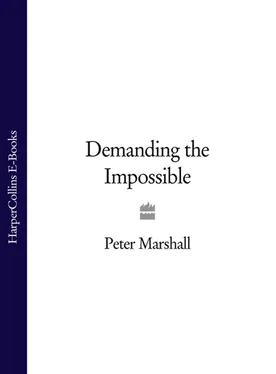The anarchists put the thing upside down. They declare that the proletarian revolution must begin by doing away with the political organization of the state … But to destroy it at such a moment would be to destroy the only organism by means of which the victorious proletariat can assert its newly conquered power, hold down its capitalist adversaries, and carry out that economic revolution of society … 40
Lenin developed Marx’s and Engels’s view of the State. As a general principle, he declared that ‘we Marxists are opposed to all and every kind of State’. 41 In his pamphlet The State and Revolution , written in August 1917 on the eve of the Bolshevik seizure of power, Lenin gave ‘the most idyllic, semi-anarchist account’ of the proletarian revolution, describing how the State could begin to wither away immediately after its victory. 42 Indeed, Lenin considered the issue of the State to be of the utmost importance in the coming revolution. In his commentary on Plekhanov’s pamphlet Anarchism and Socialism (1894), he criticizes Plekhanov for contriving completely to ignore ‘the most urgent, burning, and politically most essential issue in the struggle against anarchism, viz., the relation of the revolution to the state, and the question of the state in general!’ 43 He further differed from Engels who believed that a factory is necessarily authoritarian in its organization, by maintaining that it would be possible under communism to operate modern industrialized society without the need for compulsion or narrow specialization.
But Marxists and anarchists disagree profoundly over the means of realizing this desirable state of affairs. Marx suggested the need for the ‘dictatorship of the proletariat’ in a transitional socialist period and it has since become a central part of Marxist-Leninist orthodoxy. Yet the difference between anarchists and Marxists is more than simply a question of tactics. It also involves substantial theoretical differences. Marx’s dispute with Bakunin did have an important historical dimension, but it was fired by theoretical considerations as well. He attacked Stirner in The German Ideology and Proudhon in The Poverty of Philosophy for their failure to appreciate dialectical materialism. Where Marx tried to reverse Hegel’s position and give primacy to the capitalist economy over the bourgeois State, many anarchists persisted in seeing the State as a determining influence over the economy. Rather than recognizing the need to wait for economic conditions to develop before abolishing the State, some placed their confidence in the creative power of revolutionary will. Marx also opposed the anarchists’ rejection of imposed authority; he was keen to alter the form of authority in a communist society but did not seek to abolish the principle of authority altogether. He thought it was not only necessary to seize State power in order to defend the revolution but also to develop new kinds of social control of the productive forces.
The anarchists failed in Marx’s eyes to develop a coherent class analysis, either by taking an individualist position like Stirner, by adopting a ‘petty-bourgeois’ approach like Proudhon in his defence of the peasantry, or by having an ‘opportunist’ and ‘voluntarist’ faith like Bakunin in the creative energies of the undefined ‘people’ and the ‘lumpenproletariat’. There is of course some substance to this criticism. Unlike Marxists, anarchists do not have a specific class base. They recognize the differences in power and wealth between the rich and poor, and align themselves with the ‘people’, and stress the role of different classes at different times. Proudhon started his career mainly concerned with the peasantry only to finish up considering favourably the political capacity of the working class. Bakunin sometimes used the rhetoric of the ‘working class’ and the ‘proletariat’ but when he specified who the revolutionary workers were, they turned out to be the less-educated urban proletarians and the peasants. Although he felt, like Marx, that the proletarians would lead the revolution, he went out of his way to stress the revolutionary potential of the peasantry. In addition, he looked to the dispossessed and disinherited to rise up since they had nothing to lose but their chains.
Above all, Marx criticized the anarchists for struggling on the economic and cultural level only and failing to grasp the need for the working class to conquer political power. Politics even in its parliamentary form could be progressive for Marx; he even entertained the view that it was possible to use political means in order to go beyond conventional politics. In his instructions’ to the Geneva Congress of the International, he argued against the Proudhonists that the working class could win reforms through ‘general laws, enforced by the power of the state’ and ‘in enforcing such laws, the working class do not fortify government power. On the contrary, they transform that power, now used against them, into their own agency’. 44 Referring to Bakunin, he declared contemptuously: ‘this ass cannot even understand that any class movement, as such, is necessarily and always has been, a political movement’. 45 In particular, he condemned Bakunin for believing that ‘The will, and not economic conditions, is the foundation of social revolution.’ 46
In his dealings with Stirner, Proudhon and Bakunin, Marx certainly emerges ‘at his least appealing and at his most hectoring and heavy-handed’. 47 He not only revealed the authoritarian tendency of his own social and political thought, but also the authoritarian nature of his own personality. Moreover, his anti-anarchist manoeuvres which led to the demise of the First International ensured that future Internationals in the control of Marxists would become rigid and monolithic and that Marxism itself would harden into a dogmatic creed which brooked no dissent.
Lenin more than any one else helped contribute to this process. He took issue with the anarchists primarily on the role of the State in the revolution. He argued that they went wrong not in wanting to abolish the State, but in wanting to abolish it overnight. Lenin felt it was essential to ‘smash’ the inherited bureaucratic military State machine. But this did not mean doing away with State power altogether since it was necessary for the proletariat to use it during its dictatorship in a transitional period. Like Marx, Lenin believed in ‘democratic centralism’; it was therefore necessary to strengthen and centralize the State power in order to oppose counterrevolutionary forces and ‘to crush the resistance of the bourgeoisie’. 48
Lenin has been accused of hypocrisy in his call for the withering away of the State immediately before his seizure of power in Russia. 49 Certainly after the Bolshevik seizure of power in October 1917, he proceeded to undermine the power of the Soviets and establish a hierarchical and centralized structure of command by the ‘vanguard’ Communist Party. In his work ‘Left-Wing’ Communism, An Infantile Disorder (1920), he proceeded to castigate anarchists and socialist revolutionaries for their immature ‘opportunism’ in wanting to abolish the State immediately on the morrow of the revolution. He narrated how Bolshevism became ‘steeled’ in its struggle against ‘ petty-bourgeois revolutionism which smacks of, or borrows something from, anarchism’ and which easily goes to revolutionary extremes but is ‘incapable of perseverance, organization, discipline and steadfastness’. Indeed, he declared that anarchism was ‘not infrequently a sort of punishment for the opportunist sins of the working-class movement’. He found to his dismay that certain sections of the Industrial Workers of the World and anarcho-syndicalist trends in Russia continued to uphold the ‘errors of Left-Wing Communism’ for all their admiration of the Soviet system. 50
Читать дальше












